
By Erik Olsson
This e-book is an in depth, self-contained, updated learn of Lehrer's epistemological paintings. overlaying all significant facets, it includes unique contributions by way of the most distinctive experts within the box, outgoing from the newest, considerably revised model of Lehrer's conception. All uncomplicated principles are defined in an introductory bankruptcy. Lehrer's vast replies in a last bankruptcy provide distinctive entry to his present epistemological thinking.
Get Knowledge, Virtue, and Action: Putting Epistemic Virtues to PDF
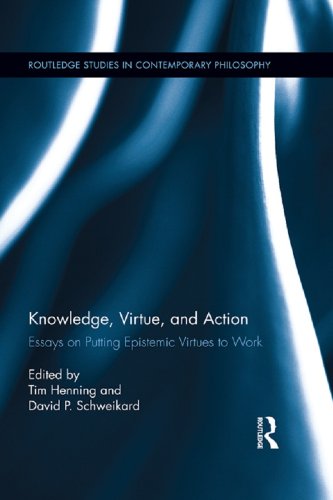
By Tim Henning,David P. Schweikard
This quantity brings jointly fresh paintings by way of top and up-and-coming philosophers concerning advantage epistemology. The clients of virtue-theoretic analyses of data count crucially on our skill to provide a few autonomous account of what epistemic virtues are and what they're for. The contributions the following ask how epistemic virtues topic except any slender obstacle with defining wisdom; they express how epistemic virtues determine in debts of assorted elements of our lives, with a different emphasis on our useful lives. In essence, the essays right here positioned epistemic virtues to work.
Tanja Proki?'s Einführung in Michel Foucaults Methodologie.: Archäologie - PDF
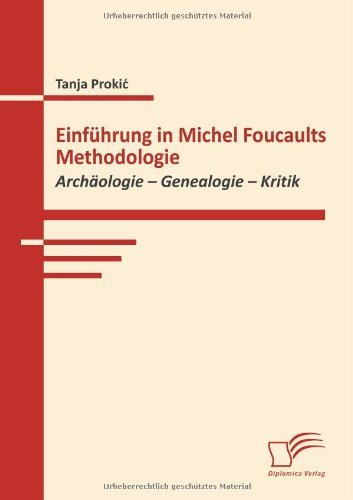
By Tanja Proki?
Obwohl der identify Michel Foucault in den letzten Jahren im Wissenschaftsdiskurs nicht mehr wegzudenken ist, ist schwer von der Hand zu weisen, dass seine Diskursanalyse häufig als Label für eine Vielzahl von Arbeiten herhalten muss, die wenig bis gar nichts mit Foucaults Untersuchungsmethoden zu tun haben. Das liegt nicht zuletzt daran, dass häufig vergessen wird, dass die Diskursanalyse von Foucault so nicht entwickelt wurde. Der Methodenkomplex innerhalb der Diskursanalyse hat eine eigene Geschichte, die gerade die Grundlage für diskursanalytisches Denken bildet und bilden muss. Foucault anwenden ohne hinter die Tiefenstruktur seiner Untersuchungen zurückzufallen, heißt seine Lektion zu erfassen. Entlang der drei großen methodischen Stationen - Archäologie, Genealogie und Kritik - wird im vorliegenden Buch die Genese seines Denkens skizziert. Um der heiklen Frage nach einer richtigen oder falschen Foucault-Rezeption weitgehend zu entgehen, wird hier der Versuch unternommen, vor allem Foucault selbst durch die zahlreichen Kommentare seiner eigenen Arbeiten anhand der Schriften zu Wort kommen zu lassen.
Seven Ways of Knowing by David Kottler PDF
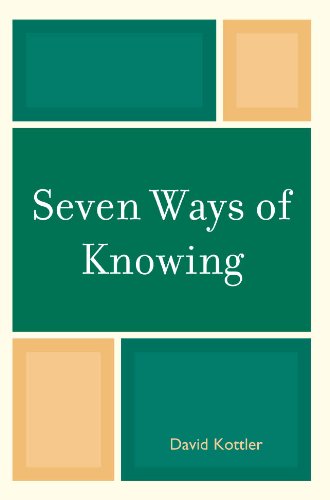
By David Kottler
Download PDF by Robert M. Frazier: Responsible Belief: Limitations, Liabilities, and
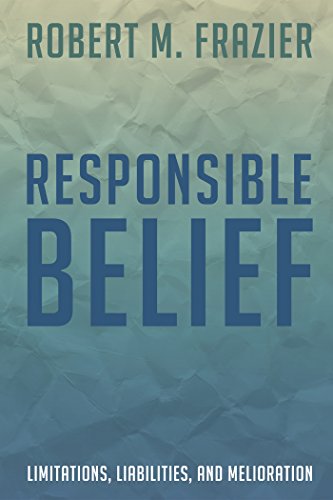
By Robert M. Frazier
"When is trust dependable and whilst is it no longer? Complexities abound during this zone of inquiry, yet Frazier contends that a solution needs to attend to the heritage and the psychology of a trust. moreover, highbrow virtues needs to be entrance and middle, in line with his tale. rules from Aristotle, Philo, Augustine, and Peirce loom huge, as theology joins philosophy within the quest for clarification. Readers will locate right here an abundance of suitable principles as they search a accountable portrait of liable belief.
--Paul ok. Moser, Professor of Philosophy, Loyola collage Chicago
"This scholarly paintings displays the seasoning of a existence shaped in and dedicated to the very issues it commends. Arguing that glossy epistemology, with its slim specialize in justification, is ill-equipped to mature humans in dependable believing, Frazier faucets the traditional greats to suggest a much wider account: people' normal inclination to fact, hampered through our prideful self-deception, could be wooed via the world's intimations of attractiveness, and restored via highbrow love and humility, and a spirituality of inquiry."
--Esther Lightcap Meek, Professor of Philosophy, Geneva collage; writer of Loving to grasp: Introducing Covenant Epistemology and different books on knowing
Robert M. Frazier is Professor of Philosophy at Geneva university, Beaver Falls, PA.
Bence Nanay's Perceiving the World PDF
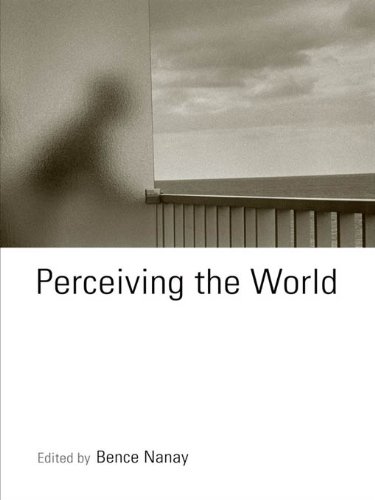
By Bence Nanay
Problemas Epistemológicos: Tradición, innovación, progreso y by Julio Planchart Brun PDF
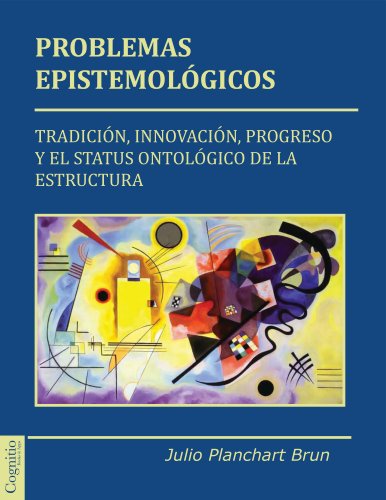
By Julio Planchart Brun
Cuando se habla de Problemas Epistemológicos, tal como se titula el presente libro, el Profesor Planchart se refiere al estudio del fenómeno del conocimiento, pero no de cualquier tipo de conocimiento sino el nivel más elevado que se puede alcanzar, que en el mundo contemporáneo es patrimonio absoluto de los angeles ciencia, así como en los angeles antigüedad clásica griega lo fue de los angeles filosofía y en el período medieval de l. a. teología. l. a. omnipresente y omnipotente ciencia que invade cada átomo de los angeles existencia humana.
Su trabajo es un fascinante viaje a través de l. a. lógica del conocimiento científico, l. a. cual es analizada desde dos perspectivas distintas, una de ellas los angeles de l. a. evolución del pensamiento científico desde el punto de vista histórico y l. a. otra los angeles que se deduce de l. a. propia práctica o del quehacer cotidiano de los científicos. Para ahondar en estos temas, se analizan los planteamientos que hacen filósofos de los angeles ciencia stories como: Thomas Kuhn, Karl Popper, Imre Lakatos, Stephen Toulmin, entre otros, quienes abordan el fenómeno con diferentes enfoques, algunos opuestos otros complementarios, que nos permiten comprender l. a. práctica científica en toda su complejidad. En este texto se esclarecen conceptos, se corrigen malentendidos y se demuestra los angeles extraordinaria dificultad del mecanismo del progreso científico, cuando es examinado sin prejuicios ni simplificaciones.
El prestige Ontológico de l. a. Estructura, subtítulo de esta gran obra, se refiere a l. a. pregunta sobre los angeles relación existente, si es que existe alguna, entre los angeles estructura de las teorías científicas y los angeles estructura de los angeles realidad. El Profesor Planchart se pregunta si las proposiciones de l. a. ciencia “pintan” l. a. realidad, entendiendo pintar como una traducción de l. a. palabra alemana bild, utilizada por Ludwig Wittgenstein en el Tractatus logico-philosophicus. Según Wittgenstein, los hechos poseen una estructura lógica que permite l. a. construcción de proposiciones que representan ese estado de cosas, lo que significa que las proposiciones pintan y que lo que pintan lo vemos en l. a. estructura de l. a. realidad, en el mismo sentido del problema planteado por Descartes cuando nos hablaba de que el orden y conexión de las principles es igual al orden y conexión de las cosas o con l. a. proposal de Galileo de que el lenguaje matemático es el lenguaje con el que l. a. naturaleza nos habla. A todo lo largo del presente libro subyace esta inquietud, planteada además por muchos filósofos, sucintamente, los angeles de los angeles relación existente entre teoría científica y realidad, que podemos también verla reflejada en los angeles Teoría de las rules de Platón, en los angeles concepción de l. a. verdad por correspondencia de Aristóteles, luego expresada por Descartes y más recientemente por el mismo Wittgenstein. Esto último apunta y está íntimamente ligado al problema de l. a. verosimilitud y de los angeles certeza del conocimiento. Adentrémonos entonces en esta magnífica aventura del pensamiento.
Earth variation: Una porción de las ventas de este título es donada a nuestro planeta.
Get Psychotherapy and phenomenology: On Freud, Husserl and PDF

By Ian Rory Owen
Read e-book online Knowing the Difference: Feminist Perspectives in PDF
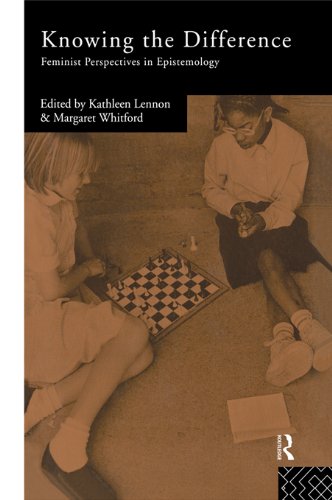
By Kathleen Lennon,Margaret Whitford
Download PDF by Theresa Schilhab,Frederik Stjernfelt,Terrence Deacon: The Symbolic Species Evolved: 6 (Biosemiotics)
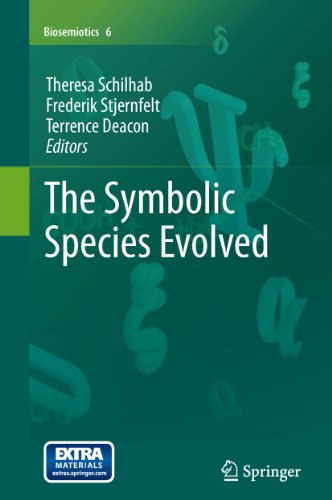
By Theresa Schilhab,Frederik Stjernfelt,Terrence Deacon
This anthology is a compilation of the simplest contributions from Symbolic Species meetings I, II (which happened in 2006, 2007).
In 1997 the yank anthropologist Terrence Deacon released The Symbolic Species: The Coevolution of Language and the mind. The booklet is broadly thought of a seminal paintings within the topic of evolutionary cognition. even though, Deacons publication used to be step one – extra steps have needed to be taken. The proposed anthology is such a big associate.
The contributions are written by means of a wide selection of students every one with a different view on evolutionary cognition and the questions raised through Terrence Deacon - emergence in evolution, the foundation of language, the semiotic 'missing link', Peirce's semiotics in evolution and biology, biosemiotics, evolutionary cognition, Baldwinian evolution, the neuroscience of linguistic capacities in addition to phylogeny of the homo species, primatology, embodied cognition and information varieties.